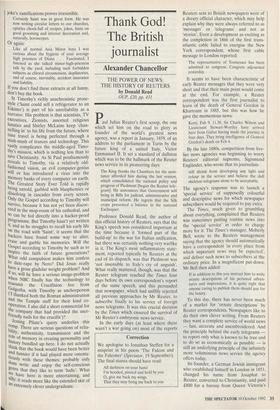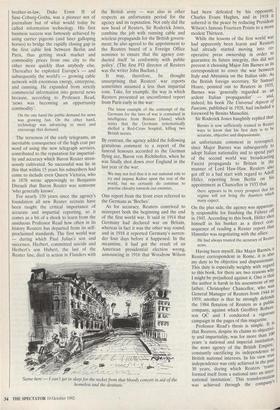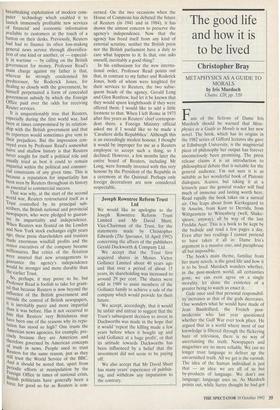Thank God!
The British journalist
Alexander Chancellor
THE POWER OF NEWS: THE HISTORY OF REUTERS by Donald Read OUP, £20, pp. 431 Paul Julius Reuter's first scoop, the one which set him on the road to glory as founder of the world's greatest news agency, was a report in January, 1859, of an address to the parliament in Turin by the future king of a united Italy, Victor Emmanuel II. It set a standard of dullness which was to be the hallmark of the Reuter news service in its pioneering days:
The King thanks the Chambers for the assis- tance afforded him during the last session, which consolidated the national policy and progress of Piedmont [began the Reuter tele- gram]. He announces that Government will bring in Bills for judicial, administrative and municipal reform. He regrets that the Silk crops prevented a balance in the national Exchequer.
Professor Donald Read, the author of this official history of Reuters, says that the King's speech was considered important at the time because it 'formed part of the build-up' to the war for Italian unification, but there was certainly nothing very warlike in it. The King's most inflammatory state- ment, reported typically by Reuters at the end of its dispatch, was that Piedmont was `not insensible to Italy's cry of anguish'. What really mattered, though, was that the Reuter telegram reached the Times four days before its own correspondent's report of the same speech, and this persuaded that newspaper, which had sniffily rejected all previous approaches by Mr Reuter, to subscribe finally to his service of foreign news telegrams. It was this crucial decision by the Times which ensured the survival of Mr Reuter's embryonic news service.
In the early days (at least where there wasn't a war going on) most of the reports Reuters sent to British newspapers were of a dreary official character, which may help explain why they were always referred to as `messages' or 'telegrams' and not as `stories'. Even a development as exciting as the completion in 1866 of the first trans- atlantic cable failed to energise the New York correspondent, whose first cable message to London reported:
The representative of Tennessee has been admitted to congress. Congress adjourned yesterday.
It seems to have been characteristic of early Reuter messages that they were very short and that their main point would come at the end. For example, a Reuter correspondent was the first journalist to learn of the death of General Gordon in Khartoum in 1885, but this was how he gave the momentous news:
Korti, Feb 9. 11.30. Sir Charles Wilson and Lieutenant Stewart-Wortley have arrived here from Gubat having made the journey in four days. They bring intelligence of General Gordon's death on Feb 4.
By the late 1880s, competition from live- lier news agencies was beginning to worry Reuters' editorial supremo, Sigismund Englander, who wrote that its journalists
still shrink from developing any light and colour in the service and believe the dull skeleton telegrams alone to be acceptable.
The agency's response was to launch a `special service' of supposedly colourful and descriptive news for which newspaper subscribers would be required to pay extra.
The Times, much given to grumbling about everything, complained that Reuters was sometimes putting routine news into the 'special service' in order to charge more for it. The Times's manager, Moberly Bell, wrote to the Reuters management saying that the agency should automatically have a correspondent 'in every place from which important news may be expected', and deliver such news to subscribers at the ordinary price. In a magnificent put-down, Mr Bell then added:
If in addition to this you instruct him to write ornate descriptions of his personal adven- tures and impressions, it is quite right that anyone caring to publish them should pay for the luxury.
To this day, there has never been much of a market for 'ornate descriptions' by Reuter correspondents. Newspapers like to do their own clever writing. From Reuters they want a complete service of world news — fast, accurate and unembroidered. And the principle behind the early telegrams to report only what is known to be true and to do so as economically as possible — is still an underlying principle of the infinitely more voluminous news service the agency offers today.
Its founder, a German Jewish immigrant who established himself in London in 1851, changed his name from Josaphat to Reuter, converted to Christianity, and paid £800 for a barony from Queen Victoria's brother-in-law, Duke Ernst II of Saxe-Coburg-Gotha, was a pioneer not of journalism but of what would today be called information technology. His first business success was famously achieved by using carrier pigeons (and later galloping horses) to bridge the rapidly closing gap in the first cable link between Berlin and Paris, thus getting stock market and commodity prices from one city to the other more quickly than anybody else. Thereafter he exploited Europe's — and subsequently the world's — growing cable network with enormous energy, enterprise, and cunning. He expanded from strictly commercial information into general news because, according to Professor Read, 'news was becoming an opportunity commodity':
On the one hand the public demand for news was growing fast. On the other hand, technology was advancing to meet and encourage that demand.
The terseness of the early telegrams, an inevitable consequence of the high cost per word of using the new telegraph services, contributed to the reputation for impartial- ity and accuracy which Baron Reuter stren- uously cultivated. So successful was he in this that within 15 years his subscribers had come to include even Queen Victoria, who in 1878 wrote approvingly to Benjamin Disraeli that Baron Reuter was someone 'who generally knows'.
For nearly 150 years since the agency's foundation all new Reuter recruits have been taught the critical importance of accurate and impartial reporting, so it comes as a bit of a shock to learn from the assiduous Professor Read how often in its history Reuters has departed from its self- proclaimed standards. The first world war — during which Paul Julius's son and successor, Herbert, committed suicide and Herbert's son Hubert, the last of the Reuter line, died in action in Flanders with the British army — was also in other respects an unfortunate period for the agency and its reputation. Not only did the new head of Reuters, Sir Roderick Jones, combine the job with running cable and wireless propaganda for the British govern- ment; he also agreed to the appointment to the Reuters board of a Foreign Office nominee to ensure that the agency con- ducted itself 'in conformity with public policy'. (The first FO director of Reuters was the writer John Buchan.) It may, therefore, be thought unsurprising that Reuters' war reports sometimes assumed a less than impartial tone. Take, for example, the way in which Reuters presented an unconfirmed report from Paris early in the war:
The latest example of the contempt of the Germans for the laws of war is contained in intelligence from Braisne [Aisne] which states that the Germans systematically shelled a Red-Cross hospital, killing two British nurses.
By contrast, the agency added the following gratuitous comment to a report of the funeral honours accorded to the German flying ace, Baron von Richthofen, when he was finally shot down over England in the last year of the war:
We may not feel that it is our national role to try and impose Kultur upon the rest of the world, but we certainly do continue to practise chivalry towards our enemies.
One report from the front even referred to the Germans as `Boches'.
As for accuracy, Reuters contrived to misreport both the beginning and the end of the first world war. It said in 1914 that Germany had declared war on Britain, whereas in fact it was the other way round; and in 1918 it reported Germany's surren- der four days before it happened. In the meantime, it had got the result of an American presidential election wrong, announcing in 1916 that Woodrow Wilson
'Same here — I can't get to sleep for the racket from that bloody concert in aid of the homeless and the destitute.' had been defeated by his opponent, Charles Evans Hughes, and in 1918 it ushered in the peace by reducing President Wilson's famous Fourteen Points to a more modest Thirteen.
While the lessons of the first world war had apparently been learnt and Reuters had already started moving into co- operative press ownership in order to guarantee its future integrity, this did not prevent it choosing Major Jim Barnes as its correspondent to cover the war between Italy and Abyssinia on the Italian side. As the British foreign secretary, Sir Samuel Hoare, pointed out to Reuters in 1935, Barnes was 'generally regarded as an ardent Italian propagandist' — and, indeed, his book The Universal Aspects of Fascism, published in 1928, had included a foreword by Benito Mussolini.
Sir Roderick Jones haughtily replied that
Barnes is now sufficiently trained in Reuter ways to know that his first duty is to be accurate, objective and dispassionate, an unfortunate comment in retrospect, since Major Barnes was subsequently to adopt Italian nationality and to spend part of the second world war broadcasting Fascist propaganda to Britain in the manner of Lord Haw-Haw. Reuters also got off to a bad start with regard to Adolf Hitler, reporting from Berlin on his appointment as Chancellor in 1933 that
there appears to be every prospect that his regime will not bring the disasters winch many expect.
On the plus side, the agency was apparent- ly responsible for finishing the Ffihrer off in 1945. According to this book, Hitler shot himself in his bunker as a direct con- sequence of reading a Reuter report that Himmler was negotiating with the allies:
He had always trusted the accuracy of Reuter news.
Having been myself, like Major Barnes, a Reuter correspondent in Rome, it is also my duty to be objective and dispassionate. This duty is especially weighty with regard to this book, for there are two reasons why I might be prejudiced against it. One is that the author is harsh in his assessment of my father, Christopher Chancellor, who was General Manager of Reuters from 1944 to 1959; another is that he strongly defends the 1984 flotation of Reuters as a Public company, against which Geoffrey Robert- son QC and I conducted a vigorous campaign in the pages of this magazine. Professor Read's thesis is simple. It 1.s that Reuters, despite its claims to objective' ty and impartiality, was for more than .100 years 'a national and imperial institution: the news agency of the British Empire, constantly sacrificing its independence to British national interests. In his view true independence was only achieved in the past 30 years, during which Reuters 'trans- formed itself from a national into an inter- national institution'. This transformation was achieved through the company 5
breathtaking exploitation of modern com- puter technology which enabled it to launch immensely profitable new services of financial and economic information available to customers at the touch of a button on their desks. Previously, Reuters had had to finance its often loss-making general news service through diversifica- tion of one kind or another, or — especial- ly in wartime — by calling on the British government for money. Professor Read's main charge against my father is that, whereas he strongly condemned his predecessor, Sir Roderick Jones, for dealing so closely with the government, he himself perpetuated a form of concealed government subsidy by which the Foreign Office paid over the odds for receiving Reuter services.
It is unquestionably true that Reuters, especially during the first world war, had been at times compromised by its relation- ship with the British government and that its reporters would sometimes give vent to their prejudices. But the impression con- veyed even by Professor Read's somewhat naive and shallow history is that Reuters never sought for itself a political role and usually tried as best it could to remain impartial within the political and commer- cial constraints of any given time. This is because a reputation for impartiality has been seen by Reuters throughout its history as essential to commercial success.
That was why, at the start of the second world war, Reuters restructured itself as a Trust controlled by its principal sub- scribers, the British national and provincial newspapers, who were pledged to guaran- tee its impartiality and independence. When Reuters was floated on the London and New York stock exchanges eight years ago, these press shareholders and trustees made enormous windfall profits and the senior executives of the company became millionaires. But critics of the flotation were assured that new arrangements to guarantee the agency's independence would be stronger and more durable than the earlier Trust.
So, perhaps, it may prove to be, but Professor Read is foolish to take for grant- ed that because Reuters is now beyond the influence of the British government and outside the control of British newspapers, tt Is inevitably purer and more impartial than it was before. Has it not occurred to have that Reuters' very Britishness may naye been one of the reasons why its repu- tation has stood so high? One trusts the American news agencies, for example, pre- cisely because they are American and therefore governed by American concepts of truth in news. People used to trust Reuters for the same reason, just as they still trust the World Service of the BBC. And it should be noted that, apart from periodic efforts at manipulation by the British Office in times of national crisis, brittsh politicians have generally been a force for good so far as Reuters is con-
cerned. On the two occasions when the House of Commons has debated the future of Reuters (in 1941 and in 1984), it has shown the utmost concern to preserve the agency's independence. Now that the agency has freed itself from any kind of external scrutiny, neither the British press nor the British parliament have a duty to care what happens to it. Is that, one asks oneself, inevitably a good thing?
In his enthusiasm for the new interna- tional order, Professor Read points out that, in contrast to my father and Roderick Jones, both of whom were knighted for their services to Reuters, the two subse- quent heads of the agency, Gerald Long and Glen Renfrew, had let it be known that they would spurn knighthoods if they were offered them. I would like to add a little footnote to that. When I left Rome in 1973 after five years as Reuters' chief correspon- dent there, a Foreign Ministry official asked me if I would like to be made a 'Cavaliere della Repubblica'. Although this is an exceedingly modest honour, I thought it would be improper for me as a Reuters employee to accept such a thing, so I declined. However, a few months later the entire board of Reuters, including Mr Long, were formally invested with this very honour by the President of the Republic in a ceremony at the Quirinal. Perhaps only foreign decorations are now considered respectable.
Joseph Rowntree Reform Trust Ltd We would like to apologise to the Joseph Rowntree Reform Trust Limited and Mr David Shutt, Vice-Chairman of the Trust, for the statements made by Christopher Edwards (The Spectator, 18 April 1992) concerning the affairs of the publishers Gerald Duckworth & Company Ltd.
We accept that the Trust first acquired shares in Messrs Victor Gollancz Limited about 40 years ago and that over a period of about 15 years, its shareholding was increased to around 29 per cent. The shares were sold in 1989 to assist members of the Gollancz family to achieve a sale of the company which would provide for their future.
We accept, accordingly, that it would be unfair and untrue to suggest that the Trust's subsequent decision to invest in Duckworths was made in the hope that it would 'repeat the killing made a few years before when it bought up and sold Gollancz at a huge profit', or that its attitude towards Duckworths has been influenced by a belief that the investment did not seem to be paying off.
We also accept that Mr David Shutt has many years' experience of publish- ing, and withdraW any imputation to the contrary.




























































 Previous page
Previous page